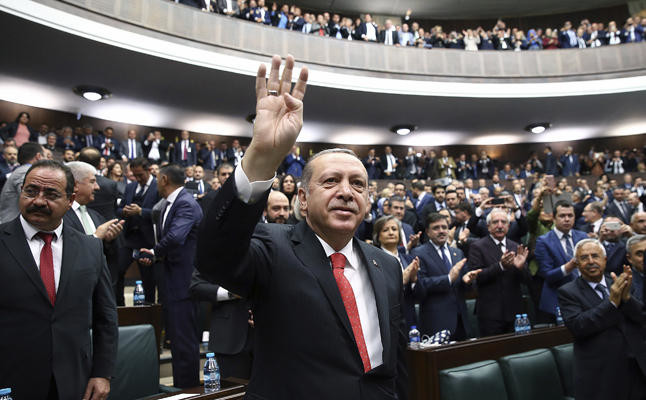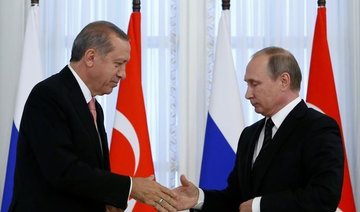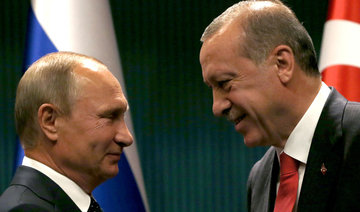ANKARA: Ankara and Moscow continued their coordination on Syria ahead of the seventh round of peace talks in Astana on Monday.
On Oct. 28, according to presidential sources quoted in Turkish media, President Recep Tayyip Erdogan and his Russian counterpart Vladimir Putin discussed the latest developments in Syria by phone.
They reportedly underlined the significance of closely coordinating in Syria’s northwestern province of Idlib, where the Turkish military recently began building observation posts as part of a “de-escalation” deal brokered by Ankara, Moscow and Tehran last month.
Experts say they expect Idlib to dominate the agenda of the upcoming Astana meeting, which is due to last for two days.
“The Turkish Army is working very closely with Russia to secure and monitor the de-escalation zone in Idlib,” Emre Ersen, a Syria analyst at Marmara University in Istanbul, told Arab News.
“Russia expects Turkey to play an influential role there in keeping rebel groups away from the Al-Qaeda-affiliated Hayat Tahrir Al-Sham.”
Turkey’s alleged plan to launch an operation against Kurdish forces in the neighboring region of Afrin is also likely to be discussed.
“It’s not clear whether Moscow is ready to give Ankara a free hand over Afrin yet,” said Ersen.
“This is mainly because Russia has remarkably improved its relations with the Syrian Kurds in the last few years, in the belief that they’d play a crucial role in the reconstruction of post-Daesh Syria,” he added.
“Although Moscow perceives the YPG (People’s Protection Units) as under the influence of Washington, it still wants to maintain its leverage over the Syrian Kurds.”
Ersen said the draft constitution prepared by Russia a few months ago, which includes greater autonomy for Syrian Kurds, will continue to be the main point of disagreement between Ankara and Moscow.
The Astana talks have been led by Turkey, Russia and Iran. Representatives of the Assad regime, armed opposition groups, the UN, the US and Jordan are expected to attend the upcoming meeting.
Ersen said Moscow and Tehran know that they need active Turkish cooperation, at least in the short term, in order to keep Syrian rebel groups under control.
“So they might try to appease Ankara with a few minor concessions regarding Afrin,” he added.
“Considering the latest rapprochement between Turkey and Iran over the Kurdish independence referendum in northern Iraq, they might use this new momentum to reach an understanding about the Syrian Kurds.”
So far, Turkish troops have installed two observation posts in northern Syria, and the number is expected to reach 14.
Mehmet Seyfettin Erol, head of the Ankara-based think tank ANKASAM, said Turkish and Russian interests converge on the need to develop an efficient dialogue mechanism regarding current and potential developments in their neighborhood.
“The Astana peace process confirmed that both parties will cooperate to end the conflicts in Syria and Iraq, and to preserve their territorial integrity,” Erol told Arab News.
“I don’t think there’s a divergence between Moscow and Ankara over the YPG and its political wing the PYD (Democratic Union Party),” he said.
“They just differ on one thing: Turkey doesn’t consider any terror group a counterpart in the negotiations, while Russia doesn’t want to leave the PYD/YPG to the US.”
But Erol said the Turkish-Russian partnership in Syria will be tested if Ankara launches a military offensive in Afrin and Manbij.
“During this seventh round of Astana talks, I expect the parties to underline that they won’t tolerate any terror corridor along Syria and Iraq, and they’ll call for a joint stance against separatist movements,” he said.
Russia will also give a green light to Turkey’s ongoing security and anti-terror operations in Idlib, Erol added.
Ankara, Moscow coordinate steps ahead of new round of Astana talks
Ankara, Moscow coordinate steps ahead of new round of Astana talks

Sudan defense minister dismisses ‘intelligence document’ as fabrication after convoy strike

- Gen. Hassan Kabroun tells Arab News claims that army hid weapons in aid convoy are “completely false”
RIYADH: Sudan’s defense minister has firmly denied reports attributed to Sudanese intelligence alleging that a convoy targeted in North Kordofan was secretly transporting weapons under the cover of humanitarian aid.
Gen. Hassan Kabroun described the claims as “false” and an attempt to distract from what he called a militia crime.
The controversy erupted after news reports emerged that a document attributed to Sudan’s General Intelligence Service claimed the convoy struck in Al-Rahad on Friday was not a purely humanitarian mission, but was instead carrying “high-quality weapons and ammunition” destined for Sudanese Armed Forces units operating in the state.
The report further alleged that the convoy had been outwardly classified as humanitarian in order to secure safe passage through conflict zones, and that the Rapid Support Forces had destroyed it after gathering intelligence on its route and cargo.
Kabroun categorically rejected the narrative.
“First of all, we would like to stress the fact that this news is false,” he told Arab News. “Even the headline that talks about the security of the regions, such as Al-Dabbah, is not a headline the army would use.”
He described the document as fabricated and politically motivated, saying it was designed to “cover up the heinous crime they committed.”
The minister affirmed that the area targeted by drones is under full control of the Sudanese Armed Forces and does not require any covert military transport.
“Second, we confirm that the region that was targeted by drones is controlled by the army and very safe,” Kabroun said. “It does not require transporting any military equipment using aid convoys as decoys because it is a safe area controlled by the army, which has significant capabilities to transport humanitarian aid.”
According to the minister, the Sudanese military has both the logistical capacity and secure routes necessary to move equipment openly when needed.
“The army is professional and does not need to deliver anything to Kadugli or Dalang on board aid convoys,” he said. “The road between Dalang and Kadugli is open. The Sudanese forces used that road to enter and take control of the region. The road is open and whenever military trucks need to deliver anything, they can do so without resorting to any form of camouflage.”
Kabroun further rejected any suggestion that the military uses humanitarian operations as cover.
“Aid is transported by dedicated relief vehicles to the areas in need of this assistance,” he said. “Aid is not transported by the army. The army and security apparatus do not interfere with relief efforts at all, and do not even accompany the convoys.”
He stressed that the Sudanese Armed Forces maintains a clear institutional separation between military operations and humanitarian work, particularly amid the country’s crisis.
“These are false claims,” he said. “This fake news wanted to cover up the heinous crime they committed.”
Sudan has been gripped by conflict since April 2023, when fighting broke out between the Sudanese Armed Forces and the Rapid Support Forces, plunging the country into what the United Nations has described as one of the world’s worst humanitarian disasters.
The latest dispute over the convoy comes amid intensified fighting in South Kordofan, a strategically sensitive region linking central Sudan with the contested areas of Darfur and Blue Nile.
The false report suggested that intelligence monitoring had enabled the RSF to strike what it described as a military convoy disguised as humanitarian aid. But Kabroun dismissed that version outright.
“The intelligence agency is well aware of its duties,” he said. “The Sudanese Army has enough weapons and equipment to use in the areas of operations. These claims are completely false.”
He argued that the narrative being circulated seeks to shift blame for attacks on civilian infrastructure and humanitarian movements.
“This shows that they are trying to cover up the atrocities,” he added, referring to the militia.
Kabroun maintained that the army has regained momentum on multiple fronts and remains fully capable of sustaining its operations without resorting to deception.
“The region is secure, the roads are open, and the army does not need camouflage,” he said. “We are operating professionally and transparently.”
“These claims are completely false,” Kabroun said. “The Sudanese Army does not use humanitarian convoys for military purposes.”














